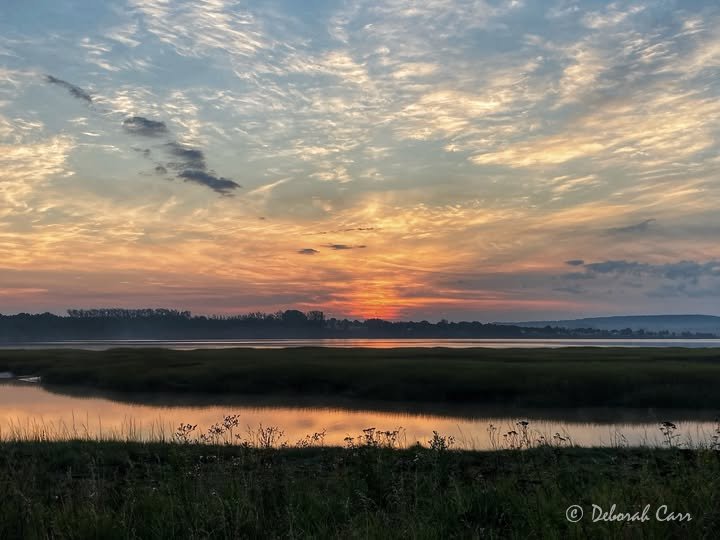Chignecto at a Crossroads: Conscience or Catastrophe?
I’m writing to express serious concerns about the proposed Centre-Village Gas Plant Project and its potential impact on one of New Brunswick’s most ecologically sensitive regions.
For years, in a voluntary capacity, my husband has assisted with monitoring several Nature Conservancy of Canada properties in the Chignecto Isthmus—a vital wildlife corridor–connecting land mammals (particularly Nova Scotia’s endangered moose population) to the rest of North America. Containing tidal marshes, tidal rivers, mud flats, inland freshwater marshes, coastal saltwater marshes, and mixed forest, the area is also home to many rare plant species, more than 220 bird species, and provides an important stopover site for migratory birds. It’s no wonder Parks Canada has designated this isthmus as one of 23 priority areas for restoring ecological connectivity. The observations and data my husband has helped collect over this time has shown increasing biodiversity, confirming that conservation efforts are yielding results.
 From my own perspective as a climate activist and biographer of New Brunswick’s environmental pioneer Mary Majka—who helped establish the Mary’s Point Migratory Shorebird Preserve on the Bay of Fundy, part of a network of globally significant areas for migrating shorebirds—I’m acutely aware of the importance of protecting migratory pathways and wetlands. Imagining the perils that species face across their global journeys deepens my conviction in the critical role our local efforts play in safeguarding the planet’s biodiversity.
From my own perspective as a climate activist and biographer of New Brunswick’s environmental pioneer Mary Majka—who helped establish the Mary’s Point Migratory Shorebird Preserve on the Bay of Fundy, part of a network of globally significant areas for migrating shorebirds—I’m acutely aware of the importance of protecting migratory pathways and wetlands. Imagining the perils that species face across their global journeys deepens my conviction in the critical role our local efforts play in safeguarding the planet’s biodiversity.
We were also active participants in New Brunswick’s 2019 Nature Legacy initiative that, supported by federal funding, doubled existing protected areas by prioritizing old growth forests, wetlands, and wildlife corridors. We’re proud that our efforts helped secure Shepody Mountain’s designation as a Protected Natural Area due to its connective role in linking coastal wetlands and other conservation zones just across the bay from the Sackville area.
These victories have been hard-won, but vital to the health of ecosystems, wildlife and humans. Vital for future generations.
As we watch the increasing impacts of climate change on wildlife populations, let us always remember Rachel Carson’s prophetic words in Silent Spring:
“We stand now where two roads diverge. But unlike the roads in Robert Frost’s familiar poem, they are not equally fair. The road we have long been travelling is deceptively easy, a smooth superhighway on which we progress with great speed, but at its end lies disaster. The other fork of the road — the one less travelled by — offers our last, our only chance to reach a destination that assures the preservation of the earth.”
We’ve never been closer to such a crossroads as we helplessly watch our rivers dry up, and our nation’s forests and communities burn, knowing in our hearts we have not done enough to conserve and protect critical forests, wetlands and precious water resources for the future. Our children and grandchildren will suffer the most from our unwise choices, our disregard for planetary health and well-being.
Siting a fossil fuel plant in a sensitive location such as the Chignecto Isthmus directly undermines decades of dedicated conservation work and risks repeating ecological disasters, such as the catastrophic 2013 loss of 7,500 songbirds to a Canaport LNG gas flare in Saint John.
NB Power’s rationale of cost savings and timely delivery cannot justify placing a fossil fuel facility in a sensitive wetland. The public has not been told what alternatives were examined and why they were rejected in favour of infrastructure that ties us to further fossil fuel use for decades. It’s especially troubling that the Impact Assessment Agency does not include greenhouse gas emissions in its mandate, despite climate change’s direct impact on the ecosystems, species migration, and Indigenous health it claims to protect.
Our nation appears set against itself in goals.
The United Nations’ International Court of Justice recently ruled that failure to act on climate change may constitute a violation of international law. Governments have legal responsibilities to address climate change. As Court President Yūji Iwasawa stated, the climate crisis is “an existential problem of planetary proportions.”
A friend once said, ‘You environmentalists don’t know how to compromise.’ But I argue that we’re facing this planetary crisis because we’ve ALL compromised far too much. We’ve compromised our values and conscience, health and well-being, knowledge and inner wisdom. We’re long past the point where environmental and climate considerations can be secondary. We MUST prioritize long-term ecological integrity and climate responsibility; therefore, I urge you to order an Impact Assessment on this ill-advised project.
—-
Deborah Carr is the President of the New Brunswick Anti-Shale Gas Alliance
